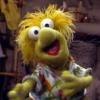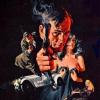Just finished it. If you'd asked me before the Dubai chapters I would've said I was liking it. I wasn't mad on the Dubai sequence but I didn't loathe it the way others here did. Unfortunately, by the end of the novel I felt damned ambivalent about it. Just my quick thoughts, I'll go into more detail after some sleep:
In CARTE BLANCHE, the scene feels like Deaver realised he needed to get Bond to Dubai in time to meet the deadline, and so concocted a way out.
This was my biggest problem with the book in that it was the most pervasive. Deaver would do a fine job writing Bond into a tense situation by the end of a chapter (or three) only to then save him using easy outs. He solves tension by revealing witheld information and it comes off as cheap writing.
By the Green Way raid I expected this to be turned around on the reader, to have Bond get into a situation where he hadn't thought one-step ahead, to see him escape the situation through sheer mental willpower and finesse. But no, we got a whole 'Surprise! Bond had slipped the vital sat-phone pen we had never heard about into Jessica's handbag THE DAY BEFORE' and 'Look! Jordaan is here!'
After the fakeout with Lamb and Felicity I was then expecting this to happen. It seemed like it did, but then it turned out Bond had the drop on Felicity! But then Dunne was outside! When Bond decided to scale the mountainface, and Niall was taking the path, I thought
finally Bond will climb to the top to realise Niall's a step ahead of him, about to kill Jordaan, but in the heat of the moment, spurred by his passion, he left his sniper rifle behind, and Bond will nail that shot. But no, Bond
expected him to take the side track.
As you can tell by my ranting, that really peeved me off. That really was my biggest gripe of the book.
Second was the plot twist that I knew was coming in some form when the bad guy was busted, his scheme gutted and the henchman on the run with fifteen chapters to spare.
While in their respective early p.o.v. chapters I initially found the characterisations of both Dunne and Hyant were rather... characature-ish? Lackluster? I can't quite think of the right word. But as they received more development I found them far more engrossing and menacing than I had earlier. The sequence where they give Bond the tour of the facility, invite him to invest, test his loyalty and where Bond then gets Jessica to break was rather fine writing for the most part.
By contrast, Felicity received very little character development beyond the artifice. What was given was sufficient for Bond's romantic interest, but not his rival. By the time Dunne's backstory with her was revealed - all in exposition, for that matter - I was too busy wondering in the back of my mind how many more twists Bond could somehow anticipate before the end to give a rat's
![[censored]](https://debrief.commanderbond.net/topic/59968-spoilers-member-reviews-of-carte-blanche/style_emoticons/default/censored.gif)
. And her explanation of her motive, which essentially amounted to "loves money and decided Merchant Bank salaries weren't sufficient" was less compelling than the Ying-Yang of derangement Severen/Niall combination
and the Gregory Lamb red herring. For the villains to essentially be in it "for the evulz" after some rather compelling red herrings was beyond a dissapointment.
Then there were some other things. Bond reading Tolkien (serially, it rates at least two mentions and one implies it was habitual) of all things and playing vigilante to a school friend's abused children felt wildly out of character to the point it felt like author insertion.
I didn't particularly care for the Steel Cartridge subplot, particularly in how it amounted to something and wrapped into a loose bow at the end. I suppose this is far more personal preference, but I think Bond searching for searching for meaning behind his parent's deaths and finding nothing would be a more compelling. And I agree that with the routes Deaver did toy with, the double-agent and feeling a need to atone would be more compelling than the "taking inspiration from his mother" sort of thing he ran with.
Dubai was lacklustre but I think that's Dubai. Cape Town was exceedingly well realised.
Now to the (mostly) postive:
- Except for the stuff mentioned above, I liked Bond's characterisation and update as a Gen X, modern man. Of course he'd network, him being an ex-smoker felt authentic to me, and I thought he was given a suitably dry sense of humour. Pulling the private jet out of his
![[censored]](https://debrief.commanderbond.net/topic/59968-spoilers-member-reviews-of-carte-blanche/style_emoticons/default/censored.gif)
was too easy, though.
- Pretty much all the scenes involving M, Moneypenny and Tanner. Despite the name-checking that plagued the novel, I thought Tanner and Moneypenny were given characterisation that Fleming neglected (I found the description of Moneypenny in her introductory scene particularly good) and M's characterisation was spot on. I thought the scene where he recruits Bond into the ODG over a meal and fends off the government ministers was better conceived than any of the rough equivalents in CR and QoS.
- Deaver's writing style. I had to agree that in the way it's paced it's rather cinematic, for the most part. And I mean that in the good way rather than the "prose-is-bland-and-spartan" way people claim Raymond Benson's style is "cinematic"
- Again, characterisation of the original supporting characters. Osborne-Smith, Lamb (until the stupid last scene), Hyndt, Dunne and (prior to the villain reveal) Felicity all came across clearly to me as a reader and felt believable and organic to the world and environment. I thought Jessica, Philly and Jordaan were much weaker, though. Jordaan was like Jane Tennison had stumbled in from 1990 without any of the vices or the sense of humour. I thought Philly had too many common interests with Bond to be believable, to the point where it took me out of the story.
- I think this iteration of Bond is fertile ground for more novels.
- If the spelling, grammar and syntax haven't clued you in, no, I still haven't had any sleep.
Edited by Robert Watts, 10 June 2011 - 09:51 PM.









